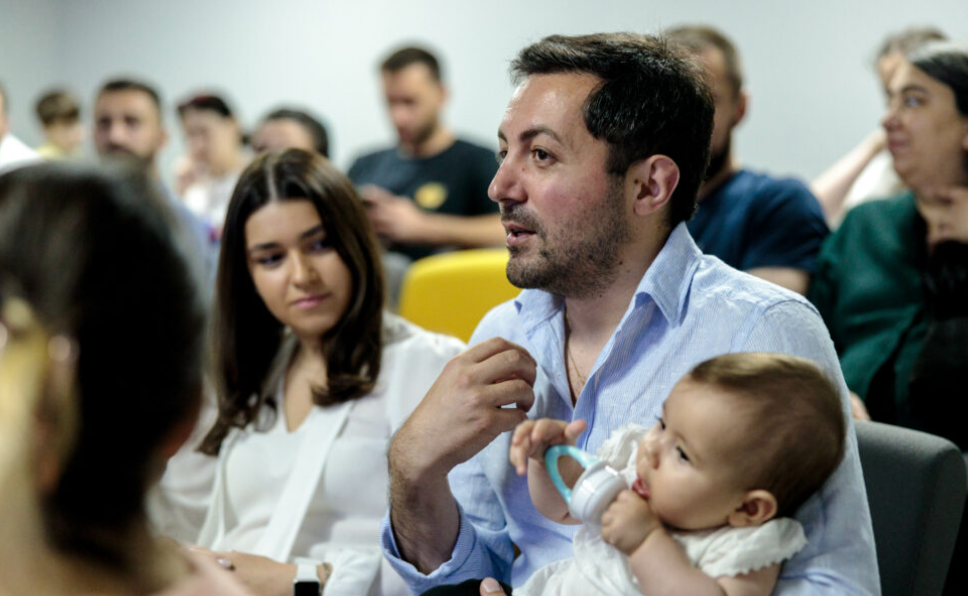Women’s economic empowerment is essential to promoting women’s rights and gender equality. Central to this effort is employment, which not only fosters financial independence but also drives personal growth and achievement.
The “motherhood penalty” and its effect on women’s careers
Despite considerable progress, a significant gender gap in labour force participation persists in Europe and Central Asia. According to the World Bank, the employment rate for women stands at 51.5%, compared to 66.4% for men. Key factors that hinder women’s participation in the workforce, according to the International Labour Organisation (ILO), include discriminatory gender roles, the burden of unpaid domestic and care work, lack of safe and accessible transportation in developing countries, and lack of affordable care services.
As a result, women with at least one child under six often face a “motherhood penalty”. This means that childbirth and childcare disproportionately impact women’s careers, making them more likely than men to take time out of the labour force or reduce their working hours for caretaking responsibilities. This leads to lower incomes and limited career opportunities compared to men. The “motherhood penalty” deepens the global gap in labour market participation, with rates dropping to 53.1% for women while remaining high at 95.7% for men, according to the ILO.
Even with signs of shifting attitudes towards the role of women in the workforce, barriers based on gender norms and stereotypes about women’s access to and growth within the labour market persist. The Baseline study on gender norms and stereotypes in Eastern Partnership countries reveals that while both women and men value participation in the labour market and access to decent work, good-mother stereotypes prevalent in the region constrain women to the home during their children’s pre-school years, limiting their participation in the workforce. Support systems and policies that help break down gender stereotypes around caregiving roles and support women’s participation in the labour force, as well as the involvement of fathers at home, are limited. Paternity leave, flexible parental leave, and leave sharing arrangements remain unavailable or inadequate in the region.
Empowering women for economic independence
Breaking down discriminatory gender norms and stereotypes to promote women’s economic independence is one of the objectives of the ‘EU 4 Gender Equality: Together against gender stereotypes and gender-based violence’ programme. Launched in 2020, this EU-funded initiative jointly implemented by UN Women and UNFPA in Armenia, Azerbaijan, Belarus, Georgia, Moldova, and Ukraine has already reached over 41 million people with messages promoting gender equality and women empowerment.
The programme challenges stereotypes and enhances women’s economic empowerment by expanding career opportunities, including in STEM fields. In Ukraine, more than 500 women participated in the ‘Будь/Be’ course, created to support Ukrainian women to get jobs in the IT and creative industries. Nina Cherlenuk, a participant in the programme, shared, “I never expected that I would be unable to return to my workplace due to the war. This course was exactly what I needed in this situation.” The programme provided mentors and experts who supported women like Nina in their job searches in tech, design, programming, software development, and testing.
In Azerbaijan, 25 women achieved significant business growth after participating in business management and financial literacy training through the ‘EU 4 Gender Equality’ programme.
“I believe that women’s role is not limited to the house, being a teacher, or a nurse. Women can be successful in anything – they just need to find what feels right for them. Women can equally contribute to their families’ income and communities. Old stereotypes should be overturned,” said Roza Salmanova from Azerbaijan, reflecting on her training experience.
Men’s engagement as a catalyst for positive change
Men’s active involvement in unpaid domestic and care work creates opportunities for women to make informed choices about seeking and engaging in paid work. As part of its efforts, the ‘EU 4 Gender Equality’ programme launched Father Schools, aimed at engaging men in their parenting roles and promoting shared responsibilities within the family.
The follow-up assessment shows that the programme’s first phase successfully influenced attitudes of fathers who attended Father Schools towards gender equality. They are more likely to support equal rights and opportunities for both men and women. They also are more likely than their non-intervention counterparts to believe that women and men are equally responsible for providing for the family and for managing the household.
“Father School helped me realise that fatherhood is more about spending quality time with your children than just contributing financially to the family,” said Elvin Hasilov from Azerbaijan. After participating in the Father Schools activities, he was determined to support his wife’s career development. He took on a significant share of household chores and childcare, allowing her to prepare for the secondary school teacher recruitment exams. “Needless to say, she scored 54 out of 60 points and got the job she wanted,” Elvin added.
As the ‘EU 4 Gender Equality’ programme continues into its second phase, the focus remains on shifting harmful stereotypes, promoting gender equality, and women’s economic empowerment. Through continued advocacy, education, and community engagement, the programme aims to foster a more inclusive society where both women and men can fulfil their potential in all aspects of life.
Photo: MenCare/Irakli Chelidze
























































